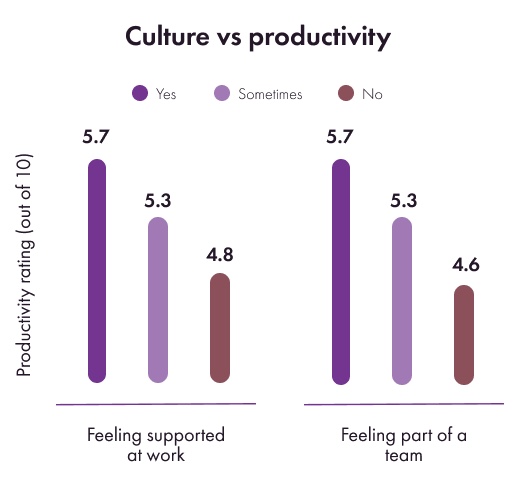The UK government has recently called upon its people to support efforts to improve the National Health Service (NHS), with a focus on easing the pressure on services. In response, we must emphasise the importance of supporting NHS employee wellbeing itself.
By prioritising healthcare workers’ mental and physical wellbeing, the system can become more resilient and better equipped to handle the current challenges it is facing.
Supporting employee wellbeing goes beyond providing a good work environment; it directly influences patient outcomes and the efficiency of healthcare delivery.
Our data has found that when employees feel valued, supported, and empowered in the workplace, their productivity and impact on operations increase.
As an employee wellbeing provider – one that focuses on all areas of workplace health – we have put together some practical ways the NHS can support employee wellbeing and how doing so will have a seismic impact on the healthcare system as a whole:
1. Implementing comprehensive wellbeing programs
Wellbeing programs that focus on mental health support, flexible working arrangements, and regular check-ins can significantly reduce burnout – something healthcare workers are at high risk of.
Exclusive data from the Champion Health platform indicates that 77% of healthcare employees are experiencing moderate to high levels of stress.
Matters like this are prevalent in high-pressure environments, and it can’t be denied that the NHS – especially in its current state – is one of those environments.
By being proactive instead of reactive and addressing these issues, the NHS can expect to see lower staff turnover and fewer absences due to illness.
This approach will help maintain continuity in patient care and reduce the financial burden on the NHS from hiring temporary staff.
2. Providing access to mental health resources
Our recent research has painted a worrying picture: 9% of healthcare workers are experiencing thoughts of suicide and self-harm.
Access to mental health services, such as counselling or stress management workshops, can offer much-needed support for staff who may be struggling.
It’s also incredibly important to normalise reaching out for mental health support and actively (and regularly) using these resources. NHS staff need to be able to seek help early without fear of shame and judgement.
Doing so will allow them to build their resilience and help them cope with the intense demands of their roles. This all leads to better patient care.
3. Encouraging rest and recovery
This may seem like an obvious one, but it can often be forgotten amidst other healthcare needs.
Creating policies that allow staff to have adequate rest periods between shifts can prevent fatigue-related mistakes and improve job satisfaction.
Out of 11 industries studied, our data revealed that healthcare is the second worst industry for sleep – with 66% of workers stating they are experiencing issues with their sleep.
65% also reported that tiredness is impacting their productivity.
This data shows the importance of employees taking regular breaks, and the NHS itself setting limits on overtime and doing all they can to support healthy sleep patterns.
A well-rested healthcare workforce is more efficient and less prone to errors, which reduces the risk of harm to patients.
4. Promoting physical health initiatives
Our research indicates that nearly half of healthcare employees are not meeting activity guidelines (150 minutes per week).
To tackle this problem, the NHS could offer onsite facilities for exercise, nutrition programs, or partnerships for discounted gym memberships to encourage staff to look after their physical health.
Helping workers improve their physical wellbeing will not only improve their productivity and reduce the number of sick days taken, but it will also boost their mental health.
This, in turn, will allow them to maintain a consistent level of motivation and dedication when caring for patients.
5. Creating a culture of appreciation and recognition
Data from our Workplace Health Report 2024 showed the direct correlation between a good culture and high levels of productivity:

It is vital to recognise the hard work and dedication of NHS employees through a variety of initiatives such as awards, feedback programs, or public acknowledgement.
Doing this can boost employee morale – something that needs to be a priority when we are dealing with a high-pressure and mentally taxing environment like healthcare.
We know that feeling appreciated has been shown to increase employee engagement and motivation, which supports talent retention and improves the overall health and happiness of staff.
What are the outcomes of supporting NHS employee wellbeing?
- Enhanced patient care: When staff are healthy, rested, and motivated, they provide better care. This reduces medical errors, improves patient outcomes, and shortens hospital stays, which can help reduce waiting times.
- Reduced staff turnover: High staff turnover leads to increased costs for recruitment and training, along with disruptions in patient care. By supporting employee wellbeing, the NHS can retain skilled professionals, ensuring consistency and quality in service delivery.
- Cost savings: Absenteeism due to stress and burnout is costly. Investing in employee wellbeing is a proactive approach that can lead to fewer sick days, reducing the financial strain on the NHS.
- Greater system resilience: A healthy workforce is better able to handle unexpected pressures, such as seasonal surges in demand or health crises. Resilient staff can adapt and respond to changes more effectively, benefiting the entire healthcare system.
Besides this, the evidence is clear that work is good for your health. If we can keep more people in work by creating healthier workplaces through preventative health measures in the workplace, we can reduce the pressure on the NHS and help reduce the 2.8 million people who are ‘economically inactive’ due to long-term sickness.
To wrap things up
Addressing NHS employee wellbeing is not only a compassionate approach (which we should all care about) but a strategic one.
It can alleviate pressure on the system, lead to cost savings, and ultimately create a more sustainable and high-performing health service.
We all want our NHS heroes to feel healthy, happy and supported. Not just because we need them to provide excellent patient care, but so the quality of their own lives and wellbeing improves.
Many of us won’t be able to understand or relate to the pressures of working in a public healthcare system – particularly one that is under-resourced and in high demand – so we must all approach healthcare employees with empathy and care.
It isn’t just down to the NHS to support their people, it’s on the general public too. To everyone reading this: it’s our duty to help create a positive environment for healthcare workers by treating them with sensitivity, kindness and patience.
They are, after all, the backbone of this system and our country.
—
To find out how the Champion Health platform supports all wellbeing for all employees, take a tour with our team:





